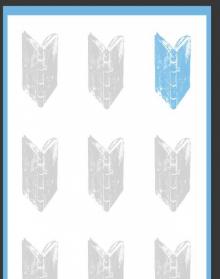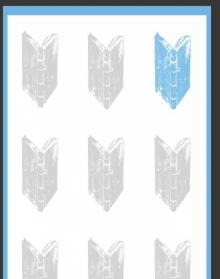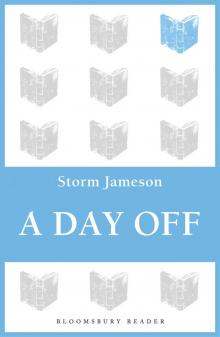- Home
- Storm Jameson
The Black Laurel Page 10
The Black Laurel Read online
Page 10
It was a hot day. The sun blistered the ground, the stones, and drew a sewer smell from the heaps of dust. Suddenly Kalb was seized by panic. His little body contracted, his arms trembled from shoulder to wrist. He felt that he was possessed. What, except an evil spirit, could enter into him here? All movement had ceased in the street; he was conscious only of its absence, the absence of everything, of the light, of sounds, voices, hands. A vacancy had opened in the street; he knew that it would suck down the ruins, and the lakes and forests beyond them, trees, houses, animals, all living men, the dead lying in the earth, and he with them.
I must run away again, he thought.
He was ashamed. He made himself take a step forward, and another. The dizziness left him.
He decided that he had been touched by the sun. With a shock of relief he saw coming towards him a man he knew very well. This time he was certain of recognition. The man had been his colleague in the university for eight years — a far more important person than himself, indeed eminent, an eminent historian of mediaeval and modern art. Dr Gustav Leist. Impossible not to recognise him: tall, strong, holding himself stiffly like a soldier, rosy and clean-shaven, not a scholarly face, the lips were too thick, and — I remember it very well, he thought — when he smiled they would part over large equine teeth. A good fellow, genial, honest, a little rough — but how much salt there is in such roughness.
He ran forward eagerly.
“My dear Leist. My dear dear fellow. How pleased I am to see you.”
An unwelcoming look was followed on Leist’s face by a brief friendly smile. He held his hand out.
“Well, Kalb, well, my friend,” he said placidly, “I didn’t know you at first. How are you?”
He was carrying a small suitcase, held together by a cord. Kalb pointed to it.
“Have you just arrived?”
Leist answered him curtly.
“Yes, I have.”
“Where have you come from?”
“From some distance.”
The coldness in his voice pierced the benevolent clouds round Kalb’s head. He realised that he had been foolishly indiscreet. He blushed.
“Forgive me,” he stammered.
He went on hurriedly, only anxious to cover up his mistake,
“This is frighful. I mean that a city can die — like this — not its own death, not properly a death at all, since a proper death leaves behind memories and you might say voices in the oldest houses and in living people’s minds — but wiped out — as if it had been nothing, as if the patience and hard work that went into it, and the dreams, were nothing. An inhuman death.”
Leist’s face became dull, a glass when you breathe on it.
“I was living here until last August of last year — a year ago. It was battered but not destroyed then. Battered, in danger — and free.”
“Free?” Kalb cried. “Under Hitler? Free?”
Leist looked at him with a pleasant smile.
“I forgot. You ran away, didn’t you, in 1934.”
“I am a Jew.” He felt grieved and at fault.
Leist’s manner softened; he spoke warmly, in a rough voice.
“There, you mustn’t mind me. I’m always offending people, without meaning to. I can’t be polite, I’m a boor.”
You’re a good fellow, Kalb thought gratefully. He felt something like love for this man who talked, if brusquely, like a friend. Leist belonged to his past. The severed ends of his life sprang together; his body grew light and swollen with joy. Now, he thought gaily, I can talk; for the first time, I can talk.
“You’re wondering why I’m here. I’m on a mission. Yes, I, Heinrich Kalb — a mission! Perhaps I’m the only German. . . I don’t know, but here I am.”
He hesitated. He had got himself back by a series of chances — which he half knew were chances. He preferred not to think so. He really believed he had been given his mission; already he saw the report, the exhaustive and masterly report, he would make on it. And present to whom? A little confusedly, he thought of presenting it to the Home Office, so long the sign for God in his life. . .
Eagerly, he went on,
“My job is to examine paintings — and other things those scoundrels — you won’t, I’m sure, mind my calling them scoundrels — after all, theft is theft — stole in the occupied countries. Easy enough to identify things from galleries and public collections, but what about the private ones? Who can tell which family such and such a picture belonged to except the expert who saw it in the house? As you know, my dear fellow, I went to a great many such houses — to fix the price of some Amberger or Cranach before it was sold — or break it to the luckless owner that his Cranach wasn’t Cranach at all but a wretched copyist! Well, well.”
“And now? What exactly are you doing here now?”
“Ah — I’ll tell you. You must remember Hilfrich, yes, the banker, who poisoned himself when he was arrested. His house in Grunewald had been bombed, but it has immensely strong cellars, positively an acre of cellars, and all but one of them are crammed with paintings, from Italy, France, Poland —”
“Poland?”
“Yes, indeed, a Rembrandt from the Lazienki collection, and already I’ve —”
Leist interrupted again in the same brusquely warm voice. His eyes, a clear greenish grey, twinkled.
“I can see you really are a missionary, my dear Kalb, full of holy zeal.”
Kalb flung up his hands.
“But to steal! To rob museums, yes, and people’s houses — no, it’s frightful!”
He was almost dancing in front of Leist, who looked down at him from his height with a shrewd barely sympathetic amusement.
“Yes, of course. . . Well, I must go. I have to find a lodging before night. Goodbye, good luck with your detective work.”
He turned and walked away, stiffly and clumsily, like a bear who has learned his drill. A little disconsolate, Kalb watched him. I could have offered him a couch, he thought; I’m slow.
Leist glanced as he passed it at the hill of rubble and dust that had been a Ministry, the one in which he worked during the war. He had taken its stone face to be the real one, now he saw that when the bombs split this open, the real building, of rough common brick, had burst through, and spilled itself shamelessly over the street. It was worth just what we lent it, he thought coldly. He smiled, remembering Kalb’s lament for Berlin’s inhuman improper death. Deliberately, he forced himself not to notice the ossuary, the nothing, that had been Berlin. He could not afford the weakness of looking back.
A year ago this month, in August 1944, he was sent to Poland, to Warsaw, to supervise the final stripping of the city’s galleries and museums. He arrived late. As he drove along the road from the air-field, in the clear dusk, he had the impression of shabby slovenly buildings, the shadows of houses, crushing between them village shops. It’s already the East, he thought contemptuously. At this moment the car stopped suddenly. A tyre had gone, torn open by the scandalously rough road. He got out and stood waiting while the driver struggled furiously with the spare. Bored, he walked a few steps from the car. The chauffeur called out.
“I wouldn’t go away, sir.”
“Why not?”
The man, a corporal, did not answer. Leist stood still. The road, vanishing ahead of him in the darkness, ran, he supposed, east. He looked in that direction. Towards the Russians: halted now but certain to begin moving again with the force, deaf and inhuman, of a stream of lava. It cost him an effort not to retreat the few steps to the car and the silent sweating driver. The sense of danger he had now came from the nearer darkness. A chink of light no wider than a knife, in a house close to the ground, shocked him: he remembered a phrase used by an officer he had questioned about Warsaw before he came: “In Warsaw the very light hates us, but it’s almost bearable compared with the sullenness, the dark hatred, rising from the soil”. . . A pity, he thought dispassionately, that we shan’t have time now to wipe out all the Poles except labourers and
machine serfs. Perhaps the Russians will finish the job for us. . . He felt no dislike of Poles, no more than he disliked animals or savages. The strongest feeling he had for them was indifference and distaste: he was not fond of animals, either.
Turning round in his indifference as if it were a bed, he managed to shake off the feeling of menace. The driver shouted that he was ready, and Leist got back into the car. The man had been working, he noticed, with his revolver dangling from his right wrist on a strap.
After this delay it was nine o’clock when they reached the hotel, the Polonia. There was another long delay, maddening, before his room was found for him. An elderly man, a Pole, kept on passing in front of him as he stood in the hall unwilling to lose sight of his luggage; each time he passed he looked sorrowfully at Leist out of the corner of his eye and murmured something about difficulty. Things are breaking down already, he thought. If anyone, any of the German officers passing through the hall, had shown the slightest interest in him, he would have made more fuss. He waited.
At last, at eleven o’clock, he was shown into a room on the top floor, bare and very small. There was a bed, a cupboard, a chair, a fixed wash-basin — that was all. No rug over the yellow boards. A naked electric bulb, blackened all over by flies. The lavatory next door was suffocatingly hot, and revolted him. What if I fall ill? he thought: he, who had never been ill, was terrified by the idea of it.
He was ravenous. Without much hope, he went downstairs again to look for food. A restaurant opened from the hall: he went in and was given an enormous meal, smoked and jellied fish, cold meats, veal with fried egs, vegetables, fruit, coffee. The long room was crowded with officers: one or two of them glanced at his uniform of the S. D., and glanced away again as if bored. Contemptuous, and obscurely hurt, he made no move to speak to anyone.
In the morning he opened the shutters of his window on a clear sky glittering above the roofs of a city which seemed to him less damaged than the Berlin he had just left.
The first thing he had to do was to find out what had been taken already, or destroyed on the spot. Included in this, the collections of the Royal Castle, Lazienki palace, Wilanow palace, of Raczynskis, Potockis, Radziwills, Branickis, Tarnowskis, Zamoyskis, of the State Mint, the National Museum, the Archeological Museum; illuminated manuscripts from the libraries; and ten carriage loads of mediæval records and archives. He knew precisely what had been and what ought to be there — ever since in 1936 he spent five months in Warsaw, living with a friendly Polish scholar who exerted himself to help his German colleague in the researches he was making for the thesis he said he was going to write.
With a cold rage, he discovered that things had been stolen freely by army officers, police, even by the clerks of the civil administration. The colonel who wanted furniture for his rooms in Warsaw, or to send his wife or some other woman at home, simply despatched his adjutant with a lorry to the National Museum. And the birthdays of officials were celebrated by gifts of paintings, tapestries, gold coins, chosen by their friends from the collections waiting in the Museum to be removed. Thefts of this sort were disorderly and immoral. If he could, he would have shot the criminals. Including the Governor-General himself.
That evening at dinner, in the hotel, a man spoke to him. He looked up. It was an officer, a Major Frey. It was years since he had seen him, but he recognised the pleasant colourless face, pale eyes and lips, pale eyelashes. He knew him to be a friendly ingenuously ambitious officer, without any other vice. If indeed ambition is not merely a tic.
Frey was the son of a peasant in the East Prussian village where Leist’s grandfather had lived: it was there they had met when, wretched and starving in Berlin, he went to stay with his grandfather to recover. He felt an easy warmth, almost affection. No need for stiffness with this officer born a peasant.
They ate together merrily, and after dinner strolled out into the street. Near the hotel, two military policemen were fastening to the wall a notice on pinkish-grey paper: it carried a long list of names. At once, from both sides of the street, men, women, and children, moved towards it with the swiftness of iron filings. He had seen notices of the kind during the day. They were lists of hostages taken from houses and cafés, and shot.
A young woman reading the names became white, and swayed. She moved away like a sleepwalker. Whose name had she read? Husband’s? A brother’s, a friend’s?
They sauntered on. The evening was warm and clear; the light had a gaiety, a peculiar soft brightness, which struck him: he was sensitive to atmosphere. When he commented on it to Frey,
“Yes,” Frey said, slowly: “it’s a strange thing, but even with what it has to put up with this is not a sad place. Or rather, I have the feeling that it has buried its gaiety in the earth — a seed, seeds, waiting to sprout.”
He smiled wryly.
“My dear Leist, I haven’t turned poet. . . Do you know, I regret certain things. I regret the baroque palaces burned in 1939. I regret the disappearance of the seventeenth and eighteenth centuries. I regret the burning of libraries: I haven’t got over my childish reverence for books — which cost so much. To tell you the truth I even avoid, when I can, passing the ghetto. That immense, yes, immense field of bricks and rubbish disgusts me. I remember something my mother said to me when I was a boy: A house when it is sound and strong is alive, it shouldn’t be hurt. . . And that was wilful murder . . . So, you know, was the plan — I believe you worked on it — to destroy everything except the old quarter — labelled ur-deutsche — and build round it a modern German city. Ridiculous.”
Leist turned on him a look of friendly irony.
“You can talk like this to me. I have no liking for our gothic purists. But don’t get yourself into trouble.”
Frey sighed.
“Since the war is lost —”
“Unless,” Leist interrupted, “unless the scientists really have something up their sleeves.”
“In any case, Poland — this country can’t be held.”
Leist did not answer. A dull anger rose in him when he thought that people like the Poles had possessed so much, so many valuable things, so much grace. They ought never to have had them. Glancing sideways again at Frey, at his downcast face, he supposed that he knew Warsaw was going to be demolished. Of course he did. The preparations had been going on for too many months, buildings had been mined, squads of men trained for their work of demolition. He jeered silently at Frey’s affectation — it must be that. His sense of well-being — he had fed marvellously — softened him towards the poor fool. He held his tongue.
They turned a corner. A young woman was standing, face to the wall, her shopping basket on the pavement at her feet, holding in her hand some of her clothes. She was being searched. She wore drawers, cotton ones. Two soldiers, stretching the elastic, were looking down them at the back, and grinning, while a third took a photograph.
They drew themselves up to salute, and the young woman tried to hide her face.
When he had passed, Leist heard one of them say,
“Here, did she spoil it?”
Boys, children, he thought indulgently. At this moment — they were passing a charming colonnade — Frey himself saluted, with strict vigour.
“What is it?”
It was the tomb of the Unknown Soldier — Polish, of course. Well, really, he thought, amused and contemptuous. The fatuity of soldiers went beyond childishness.
“Why on earth?”
Frey looked at him calmly.
“After all — a soldier. And so long as it stands there.”
“Ah, I see you don’t want to preserve it.”
After a moment Frey said,
“What are you doing in Warsaw?”
“I? I’ve come to get away as many as I can of the paintings and the other valuables still here. No use leaving them.”
Frey was silent. They had turned back towards the hotel, where Frey, too, slept. A breeze started up. Blowing from the east, it had a dry spicy heat, as if it w
ere the breath of those endless plains. There was a smell of burning wood, aromatic — a pine forest must be on fire — and yes, close at hand, the monotonous sound of crickets in the warmth of a garden. Abruptly, tearing this frail life across and across, a clatter of shots — brief.
Frey halted him sharply, a hand on his wrist. They were close to the hotel. A line of police was drawn across the street. Between two of the men, he saw the wall of the house, with the rough marks in it of bullets, the bodies lying like sacks below it, and the second line of five men standing unsteadily in front of the rifles. Men? One was only a boy his face contorted with grief and terror, hands crossed, clasped tightly on his breast. An older man held his hands queerly away from his body, the fingers rigid, as if to keep off the blow he felt coming. The faces of the other three, young men, were without expression. All were naked, except for a shirt worn by one of them, and a policeman was piling the garments together neatly, with the shoes, to take away. No waste.
At the other side of the street a group of Poles stood and watched, silently. One, only one, wept. Were they being held there, or had they stayed to keep their fellows company?
The soldiers fired. In an instant the boy’s face disappeared in a spreading wound. He fell in the same instant. The wall, with its fresh stains, reappeared, nakedly, in sunlight. Among the onlookers an old woman knelt down; two policemen approached her, one kicked her on the buttock and with the help of the other jerked her, not unkindly, to her feet.
Lifted up by a hand and a leg, the bodies were being slung into the waiting lorry: with Frey hurrying beside him, he could walk on.
Except for the terrible face of the boy when it was torn open, it had been a spectacle, like another. He had been more startled in the theatre. He said so genially to Frey, who spoke in an absent voice.
“Time we left here. In the end, executions are not good for the men.”
He seemed only tired; his pallor had become yellowish. His eyelids fluttered. An unhealthy chap, Leist thought. He was glad to leave him in the hall of the Polonia and return to his comfortless bedroom. He stood in the window a long time, and watched darkness flowing into the light, slowly, a slow stain. How long have I? he wondered.

 Company Parade
Company Parade The Lovely Ship
The Lovely Ship The Moment of Truth
The Moment of Truth The Road from the Monument
The Road from the Monument The Journal of Mary Hervey Russell
The Journal of Mary Hervey Russell The Black Laurel
The Black Laurel A Day Off
A Day Off